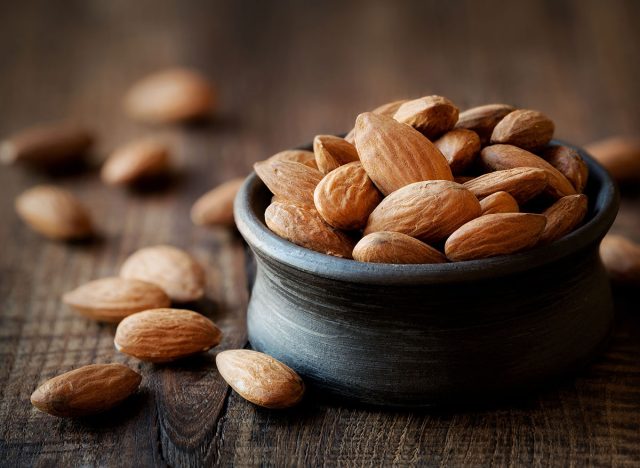These delicious additions to your diet could be the key to keeping your heart healthy
Heart disease affects millions of Americans each year and is the leading cause of death both within the U.S. and globally. In fact, a 2019 study published in Circulation found that approximately 48% of U.S. residents suffer from some kind of cardiovascular disease, with the risk of developing heart disease increasing with age.
However, just because you’ve been diagnosed with heart disease doesn’t mean you can’t live a long, healthy life. With adequate exercise, the right diet, and routine medical care, you can manage your heart disease and potentially reduce your risk of adverse health events down the line. If you want to protect your health, read on to discover which foods registered dietitians recommend for people with heart disease. And for more simple ways to improve your wellbeing, check out The 7 Healthiest Foods to Eat Right Now.
Nuts

While nuts may be high in fat, experts say they can still be safely incorporated into your diet, even if you have heart disease.
“Nuts are a powerhouse of antioxidants, healthy fats, and fiber. Including several one-ounce servings per week lowers cholesterol and decreases inflammation in the body,” says Tina Marinaccio, MS, RD, CPT, founder of Health Dynamics, LLC.
However, Marinaccio does recommend using them sparingly. “Because of the fat content, nuts are high in calories, so be sure to measure portions, or consider using as a condiment on salads and in yogurt,” she explains.
Oatmeal
If you want to start your day off with a heart-healthy meal, look no further than that container of oats in your cabinet. Amy Goodrich, MS, RD, owner of Leading Edge Nutrition, LLC, says that oats are a great choice for people with heart disease.
“Oats are a whole grain and a good source of fiber. The soluble fiber in oats helps to reduce the absorption of LDL (‘bad cholesterol’) in the bloodstream,” Goodrich explains.
Fatty fish
Think you have to cut out all animal-based products once you’ve been diagnosed with heart disease? Think again. While it’s important to get the A-okay from your doctor before adding new foods to your diet after being diagnosed with heart disease, Goodrich says that incorporating fatty fish into your meal plan can be a great way to improve your cardiovascular wellbeing.
“Fatty fish like salmon and tuna are an excellent source of omega-3 fatty acids. Eating fish twice a week can help lower triglycerides, blood pressure, and total cholesterol—all of which are biomarkers for heart disease,” Goodrich explains.
RELATED: Everyday Habits That May Lead to Heart Attack, According to Science
Beans
If you’re looking for a tasty way to load your heart disease-friendly diet with protein without adding heaps of saturated fat and cholesterol to your meals, beans are an excellent choice.
“Beans and legumes have fiber and plant protein, which are great for the diet,” says Goodrich. “Beans can also reduce inflammation in the body and reduce blood pressure, which is beneficial for heart health.”
Berries
Dessert doesn’t have to be taken off the table because you have heart disease—but it is wise to make healthier choices when it comes to satisfying your sweet tooth. That’s why Colleen Christensen, RD, founder of Colleen Christensen Nutrition and No Food Rules, recommends adding berries to your meal plan.
“Berries are a great source of protective antioxidants and phytochemicals that are associated with cardiovascular health,” Christensen explains.
Unprocessed soy
If you’re looking for meat-free protein sources, Laura Yautz, RDN, LDN, NBC-HWC, a registered dietitian specializing in heart health and founder of Being Nutritious, says that adding some unprocessed soy products to your meal plan can be a great choice for people with heart disease.
“Soy sometimes gets a bad rap, but it’s a superstar for heart health. Unprocessed soy foods are high in protein, fiber, healthy fats, and antioxidants that can help lower blood pressure, cholesterol, triglycerides, and inflammation,” Yautz explains.
Avocados
While your doctor may have recommended limiting fatty foods like butter after your heart disease diagnosis, you can still enjoy rich, delicious meals using avocado in its place.
“Avocados contain monounsaturated fats, which can reduce levels of cholesterol and lower the overall risk of heart disease,” says advanced practice registered dietitian Becky Kerkenbush, MS, RD-AP, CSG, CD, FAND, president of the Wisconsin Academy of Nutrition and Dietetics.
“Oleic acid, an omega-9 fatty acid found in avocados, may calm inflammation in the body. Avocados also are rich in potassium (more than a banana!), Vitamin K, and fiber, all nutrients that can be beneficial to your heart,” Kerkenbush adds.
Originally published in Eat This, Not That, https://www.eatthis.com/best-foods-heart-disease/

